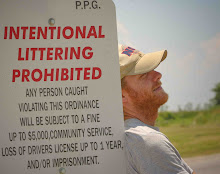An oil spill off the coast of Louisiana (yes another one) seems to have occurred over the weekend. Light patches of "weathered oil" have appeared in the bays around Grande Isle. Reports of a petrochemical sheen upwards of 100 miles long have also been described in the Gulf waters around the "Birdfoot," the Mississippi River's terminus where the mighty river splits into three stems, the Southwest Pass, Pass A Loutre, and South Pass. According to the Times Picayune, the Coast Guard is "investigating that as a separate incident" from the mysterious oily pollution floating around Grande Isle. So we have perhaps two spills of unknown quantities, large enough however to force officials to mobilize miles of booms and other materials in a frantic effort to try to contain the damage?
As of this writing the source(s) of oil are unknown, but some Coast Guard officials have speculated that the sheen offshore may have been caused by flooding and dredging far up the Mississippi River watershed, carrying toxic pollutants mixed with sediment out the river's mouth. It's an interesting theory that stems from a sad fact; the once majestic waterway that some call "America's sewer" is now so horribly fouled as to produce oil spills as though they were seasonal regularities, vomited up with the March equinox in some kind of natural cycle like snow melt. Oil film, heavy metals, plastic particulates, pesticides, nitrates, they all flow down the Mississippi when their moon rises, just like the salmon used to run in now mostly dead streams of other great American rivers.
The source of oil floating around Grande Isle is rumored to have come up from a well that is being plugged. Sound familiar? If you don't read or hear about it in the news, besides here, don't be surprised. After BP's oil-pocalypse anything less than a rig the size of the Empire State Building going up in thousand foot tall flames is probably not going to be green lighted for "all the news that's fit to print." Without a New Jersey-sized oil slick it's unlikely the national media will pay attention. What does this say about us, about the world we've created?
This routinization and normalization of disaster is magnified now with the nuclear meltdowns at the Fukushima Daiichi and Fukushima Diani plants, nightmarish events that have overshadowed any disasters of less than earth shattering proportions. These are strange days we live in when nothing less than a truly "bad star" will do: appropriately the word disaster originates from a Greek term literally meaning "bad star," a solar object that has died. Think about it. That's as big an event in the universe as there can really be. A nuclear reactor is about the closest thing humans have been able to create approaching a star on earth. By comparison it would now seem that oil spills which don't gush 80,000 barrels a day for several months are unlit flecks of space dust floating invisible across the void - they might as well not exist.
The latest oil spills in the Gulf are only one example of dozens of real time disasters you probably won't hear about. Somewhere else on earth something enormously risky is finally failing, and hundreds or thousands will die as a result. They may be dying suddenly in flames, under water or mud or rubble, or slowly and excruciatingly from toxins.
Reflecting on this seeming proliferation of bad stars, one veteran journalist who wrote extensively about the Macondo Well blowout of last year remarked a few days ago: "Here’s the simple fact: We are living in an age of disasters [....] We have environmental disasters that can lead to technological disasters (Japan) and technological disasters that can lead to environmental disasters (Deepwater Horizon)."
Indeed we are living in an age of disasters, characterized by sublimely violent and precautionary failures of technoscientific progress. It's hard for me to decide what's worse, the mega-catastrophes that dominate our attention for their sheer earth-shattering effects and global reverberations, like Fukushima, or the little disasters that now pass mostly unheard of, except to those who perish in their oblivion.

1 comment:
it's distressing the way our disasters are spawning others from all sides.
thanks for writing about this. I would not have known it happened otherwise.
Post a Comment